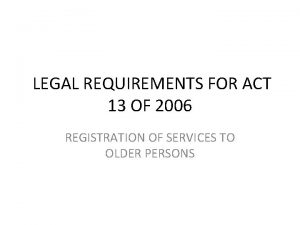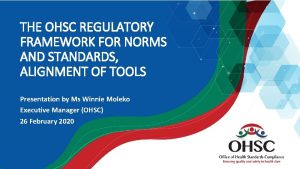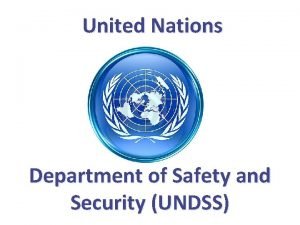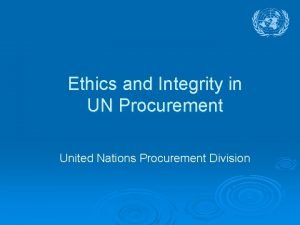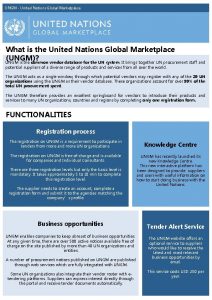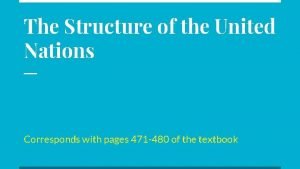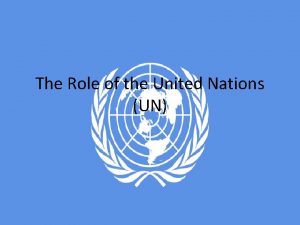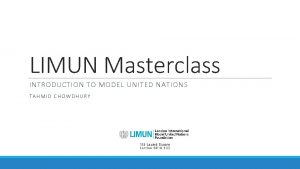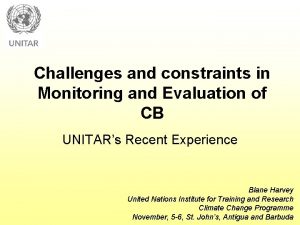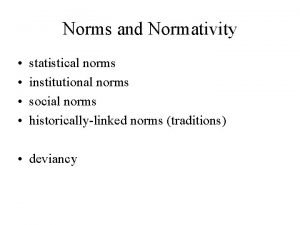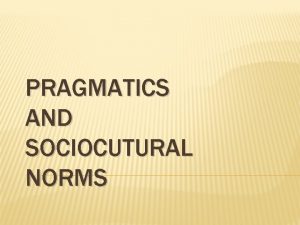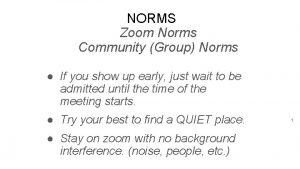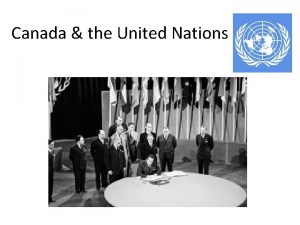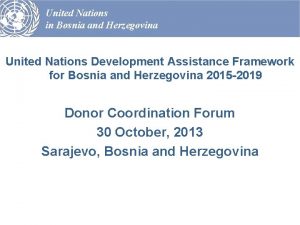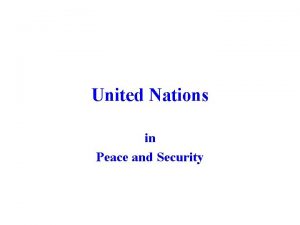UNITED NATIONS NORMS AND STANDARDS FOR EVALUATION UNITED










- Slides: 10

UNITED NATIONS NORMS AND STANDARDS FOR EVALUATION UNITED NATIONS EVALUATION GROUP (UNEG) IDEAS 1 st BIENNIAL CONFERENCE, NEW DELHI, APRIL 2005 Maya Bachner WIPO

Why UN Norms and Standards? • At present, only general regulations exist • Evaluation functions respond to different organizational expectations • Lack of common set of norms and standards that govern evaluation functions within the UN • Greater need for harmonization • “New” Results Based Management (RBM) environment with a focus on managing-for-results • Greater expectations for the use of evaluation of higher quality, both internally and externally

Why UN Norms and Standards different from those of other Organizations? OECD countries Accountability to taxpayers International financial institutions Governing Body’s oversight over the performance of the Organisation and its investments Associations Professionalization, code of conduct, methodological rigor, transparency and inclusiveness of all stakeholders UN System Inter-governmental collaboration, multiple stakeholders, Governing Bodies’ oversight, complex accountability, international values and principles, universality and neutrality, egalitarian participation

Existing framework for evaluation in the UN The Secretary General’s Bulletin ST/SGB/2000/8 September 19, 2000: • Defines the general use of evaluation in the context of programme planning and budgeting process to be followed by each respective unit/organisation of the UN • Provides broad minimal regulations for programme evaluation

New framework for evaluation in the UN The General Assembly Resolution A/RES/59/250 of Dec 2004: • Linking evaluation to performance in the achievement of developmental goals • Strengthen evaluation activities, with particular focus on development results, including through the systematic use of evaluation approaches at the system-wide level • Promotion of collaborative approaches to evaluation • UNEG to make further progress in system-wide collaboration on evaluation, in particular harmonization and simplification of methodologies, norms, standards and cycles of evaluation

UN Norms and Standards for Evaluation Aim • Harmonizing, consolidating, simplifying and strengthening the system-wide collaboration on evaluation • Ensuring that evaluation entities within the UN system operate following agreed upon basic principles • Providing a platform for strengthening and professionalizing the evaluation function and improving the quality of evaluation • Fostering a better understanding, practice and better use of evaluation, by UN evaluations functions, Organizations, Governing Bodies and stakeholders

UN Norms and Standards for Evaluation Application • All entities of the United Nations System, including Funds and Programs and Specialized Agencies • Due account would be taken of the particular objectives for evaluation work established by the Governing Body of each Organization

UN Norms and Standards for Evaluation Work in progress • UNEG Working Group on Norms and Standards established in 2002 • Comparative analysis of existing evaluation norms and standards in 2003 • Survey of the situation of evaluation within the UN system in 2003 • 2 days Working Group drafting workshop 2004 • March 2005: First draft submitted for comments • April 2005: Second draft integrating comments submitted to UNEG for consideration during UNEG annual meeting in Rome, end of April 2005.

Draft Proposed Norms for Evaluation Definition Quality Responsibility Impartiality Follow-up Intentionality Evaluability Ethics Independence Competencies Consultations, Participation and Transparency Contribution to Knowledge Building

Draft Proposed Standards for Evaluation 1. Institutional Framework and Management of the Evaluation Function 2. Competencies and Ethics 3. Conducting Evaluations (design, process, selection of team, implementation, reporting, follow-up) 4. Evaluation reports
 Older persons act norms and standards
Older persons act norms and standards Ohsc inspection tools
Ohsc inspection tools United nations department of safety and security (undss)
United nations department of safety and security (undss) Ethics and integrity at the united nations
Ethics and integrity at the united nations United nations
United nations Unmg
Unmg Six main organs of the united nations
Six main organs of the united nations Role of united nations
Role of united nations Introduction to model united nations
Introduction to model united nations Constraints in monitoring and evaluation
Constraints in monitoring and evaluation United nations zambia
United nations zambia
